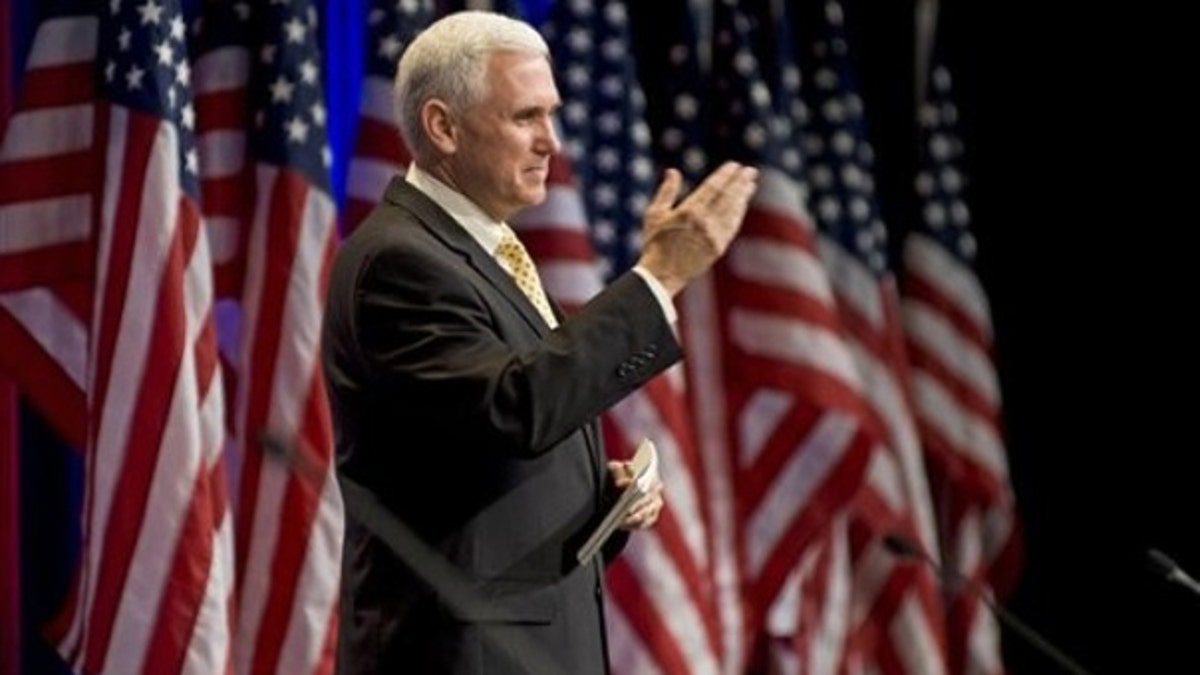
In this Feb. 19, 2010, file photo Rep. Mike Pence, R-Ind., gestures while addressing the Conservative Political Action Conference (CPAC) in Washington. (AP)
Next week's televised political showdown in Washington over health care reform will give a resurgent GOP perhaps its most prominent opportunity yet to counter Democrats' repeated claim that it is the "party of no."
Republicans have argued that they have better ideas on how to provide improved health care to more people without breaking the bank, and they see the wind at their backs in the health care debate, with polls showing the public increasingly skeptical of the Democrats' plan.
Whether they can capitalize on a bipartisan meeting that many in their own party fear is a partisan "trap" remains to be seen.
GOP leaders in the House and Senate have said they cannot accept the Democratic bills that were passed last year, and they want to start over to shape narrower legislation that cuts costs for small businesses and uses federal dollars to set up special insurance pools for people with medical problems. Critics say those measures won't come close to providing health coverage to the millions of uninsured Americans.
Republicans also want to place limits on medical malpractice judgments, an approach the Congressional Budget Office says would save money by reducing defensive medicine. Obama has toyed with the idea, saying he agrees that something should be done, but thinks limits on jury awards go too far.
And in a congressional election year, a groundbreaking bipartisan agreement is increasingly seen as unlikely. While Obama says he is open to Republican ideas for changing the health care system, many Democrats seriously doubt GOP leaders will support compromises that could draw enough lawmakers from both parties to create a bipartisan majority.
Some Republican leaders have questioned whether there's any reason to go to Thursday's summit, but they also fear a boycott would play into Obama's hands. To complicate matters, Democratic liberals have begun an effort to get a government insurance plan back in the bill, a nonstarter for Republicans.
"If the president's intention for the health care summit is to finally show that he is ready to listen and work in a bipartisan way to produce incremental reforms that the American people support, he is off to a rocky start," said Rep. Eric Cantor, R-Va., the No. 2 Republican in the House. Republicans are not going to embrace a Democratic bill that's tanking in the polls, he said.
Obama's summit represents a gamble that he can save his embattled health care overhaul by the power of persuasion -- that the Democrats' health care plan is reasonable, that much of its complexity reflects the sprawling nature of the insurance system and that lockstep Republican opposition is not reasonable and could spoil a historic opportunity on a problem that concerns all Americans.
"I don't want to see this meeting turn into political theater, with each side simply reciting talking points and trying to score political points," the president said Saturday in his radio and Internet address. "What's being tested here is not just our ability to solve this one problem, but our ability to solve any problem."
Obama's main audience will be Democrats, who must overcome their divisions -- and ease their qualms -- to get a final bill. He will also tune his pitch to independents, who soured on the Democratic bills after initially being open to health care changes.
Thursday's meeting at Blair House -- the presidential guest quarters across from the White House -- comes nearly a year after Obama launched his drive to remake health care at an earlier summit he infused with a bipartisan spirit.
The plan Obama will put before lawmakers has virtually no Republican support. Like the congressional bills, it's expected to require most Americans to carry coverage, while providing federal subsidies to help many afford the premiums. It would bar insurance companies from denying coverage to people with medical problems or charging them more. Federal and state regulators would create a competitive insurance marketplace for small businesses and people buying their own coverage. Much of the cost would be covered with Medicare cuts.
Democrats were within reach of passing a health care remake their party pursued for more than a half-century. But last month, Republican Scott Brown pulled off a Senate upset in Massachusetts to claim the seat long held by Ted Kennedy.
Democrats no longer have the 60 votes needed to overcome Republican delaying tactics in the Senate, but they still control both chambers. Yet passing anything but a very modest bill would likely mean using special budget rules that let Democrats override Republicans in the Senate with a simple majority. Using the budget route -- called reconciliation -- to resolve differences between the House and Senate bills probably would enrage Republicans.
That means Democrats will have to stick their necks out, and some may lose their seats this fall if they support an all-or-nothing push on health care.
Democrats are looking to Obama to give them the confidence they need to get back on track. He did it once before, with his address to Congress last September, after a summer of town hall meetings at which angry grass-roots activists attacked the Democrats on health care.
Democrats "tried to climb a taller mountain than they thought existed," said former House Speaker Newt Gingrich, architect of the 1994 Republican election victory that followed the collapse of the Clinton health care plan. "They went on a bigger trip than they prepared for."
Now it seems they'll be asked to give it one more try.
The Associated Press contributed to this report.




